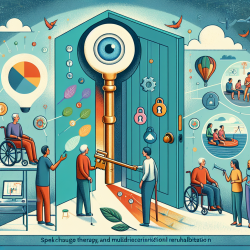In the realm of speech-language pathology, data-driven decisions are essential for creating the best outcomes for children. A recent research article titled Multidisciplinary Rehabilitation of the Mental Retard by Master Roshen S. provides invaluable insights into how multidisciplinary approaches can enhance therapeutic outcomes. As practitioners dedicated to the welfare of children, it is crucial to continually refine our skills and stay updated with the latest research. This blog will help you understand the key findings of this study and how you can implement them to improve your practice.
The Power of Multidisciplinary Rehabilitation
The research emphasizes the importance of a multidisciplinary approach in the rehabilitation of individuals with mental retardation. Here are the key takeaways from the study:
- Collaborative Efforts: The study highlights the significance of involving various specialists, including psychiatrists, speech-language pathologists, occupational therapists, and educators, to provide comprehensive care.
- Holistic Treatment Plans: A well-rounded treatment plan that addresses medical, psychological, educational, and social aspects can lead to better outcomes.
- Continuous Monitoring: Regular assessments and adjustments to the treatment plan based on data and feedback are crucial for sustained progress.
Implementing Multidisciplinary Approaches in Your Practice
To effectively implement the outcomes of this research in your practice, consider the following steps:
- Build a Collaborative Team: Establish a network of professionals from various disciplines who can contribute to the holistic care of your clients.
- Create Comprehensive Treatment Plans: Develop individualized treatment plans that incorporate input from all team members, ensuring that all aspects of the child's development are addressed.
- Regular Data Collection: Use data-driven methods to continuously monitor progress and make necessary adjustments to the treatment plan.
- Family Involvement: Engage the child's family in the rehabilitation process, providing them with the necessary tools and support to reinforce therapy at home.
Encouraging Further Research
While this study provides a strong foundation, further research is essential to continue improving our understanding and methodologies. Practitioners are encouraged to engage in or support ongoing research efforts. Here are some ways to contribute:
- Participate in Studies: Join research studies that focus on multidisciplinary approaches to rehabilitation.
- Share Your Findings: Publish your own findings and case studies to contribute to the collective knowledge base.
- Stay Updated: Regularly review current literature to stay informed about the latest advancements in the field.
By integrating these research outcomes into your practice and supporting further research, you can significantly enhance the quality of care you provide to children. For a deeper understanding, I highly recommend reading the original research paper: MULTIDISCIPLINARY REHABILITATION OF THE MENTAL RETARD.










